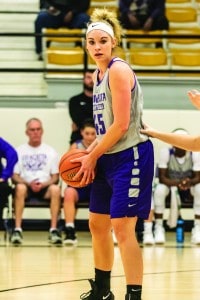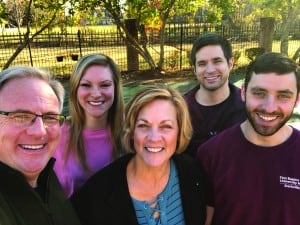The Ouachita Baptist University Tigers have on their women’s basketball roster a young Memphian who has defied dozens of odds.
After a tough tryout that the coach was reluctant to even offer, the team accepted Laura Spradlin as a walk-on player. This was just two years after Laura and her parents didn’t even know whether she would be alive for tryouts.

Today, Laura is living her dream of playing college basketball thanks to the care she received at Regional One Health.
Laura lived through a crushing car accident. It happened on an afternoon that started off like every other day – math tutoring for Laura, a lunch meeting for dad, and lunch out for mom, who home-schooled Laura.
Laura’s green sedan took a direct hit from a truck on a driving route that Laura traveled often. Just like that, Laura went from a hard-working teen who had mastered classical piano and had future plans to play college basketball to a trauma patient at Regional One Health.
Lee Ann and Mike Spradlin, Laura’s parents, arrived at the Regional One Health Elvis Presley Trauma Center to a dizzying array of bad news. The lower half of her skull had detached from the upper half and her brain was hemorrhaging. Many of her bones had broken. She had severe bleeding throughout her body.
“Even with our faith, it was a very dark time,” her dad remembers. “We didn’t know if she was going to make it. Even if she did, we knew there was the possibility of massive brain injury and disability.”
Joyous moments kept the family afloat during Laura’s recovery. The day she came out of her coma, a nurse called the Spradlins immediately. Mike thought Regional One Health was calling to discuss yet another surgery. Instead, he heard his daughter’s voice in the background. “Dad?” When the nurse put Laura on the phone she said, “Dad, I think I’m in the hospital. Can you come pick me up?”
“That was the best Sunday of my life,” Mike attests.
Laura let everyone – staff, doctors, nurses, family, friends – know that she was going to beat the odds in special ways that only Laura could do. When a physical therapist told her to take one step, she said, “I’m going to take 10!” And she did.

The Spradlin family was faced with devastating news after Laura’s car accident, but today they’re grateful to Regional One Health for the medical care she received.
When wearing an eye patch and a large elbow brace, she sat down at a piano in a therapy room and played, from memory, a Rachmaninoff piece. The brain function was there. Watching Laura at the piano, the speech therapist assured Laura’s parents: “Your daughter’s going to be OK!”
Today, Laura’s beautiful smile radiates. As she thinks about her time with Regional One Health’s doctors, nurses and staff, she recalls, “They literally put my face back together. I really appreciate them and how much training they have to go through and how much they help people. They’re just really awesome.”
“To now have a functioning brain and be back in school, to be able to play basketball, to go through life like I would have before the accident,” her voice trails off and she chuckles shyly. “Life after the crash is more meaningful.”
To the 17 doctors, nurses and staff who saved her life and rehabilitated her back to full health, Laura says: “Thank you. Thank you and keep doing what you’re doing, because it’s so necessary.”
Laura’s grateful parents agree, describing how doctors and nurses went above and beyond.
“The nurses here are excellent. They know what to watch for, they know how to educate the parents. One nurse asked me if anyone had told me what parts of Laura’s brain were affected by the bleeding. She handed me the chart she was looking at and went through every part of Laura’s brain with me, explaining the possible ways the bleeding could affect Laura’s life. I wouldn’t have known that if she wouldn’t have taken the time to help me,” Lee Ann said.
“Dr. Martin Croce helped us decide what to do with Laura after she left trauma care. There is a rehab center in Atlanta where he sometimes sends patients, and he explained that Regional One Health also has experts right here in Memphis. He did all of the research about the other facility for us and even gave us questions to ask each center. He patiently and gently explained our options. We wouldn’t have known how to decide without him. We chose Regional One Health,” Mike said.
Stories like Laura’s are made possible by Regional One Health Foundation donors, who pave the way for advanced training for doctors, nurses and staff, and the purchase of specialized equipment that is essential in saving and enriching lives. Funds raised help all facets of the hospital system, from trauma care to outpatient services such as rehabilitation.

